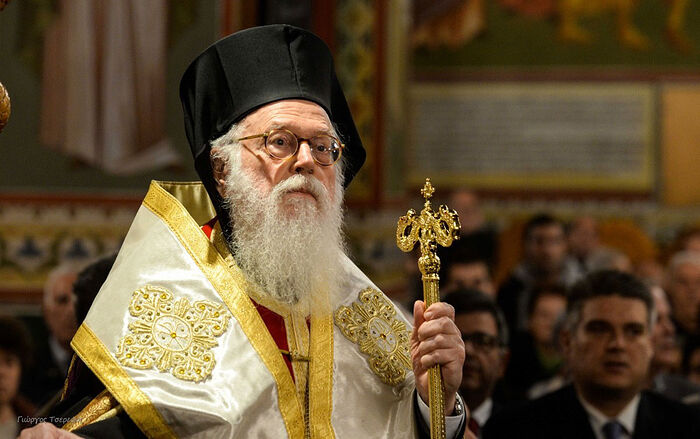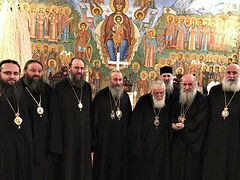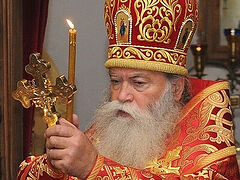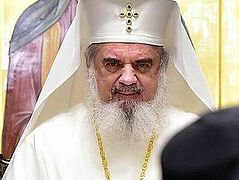Tirana, Albania, January 29, 2021
 Archbishop Anastasios of Albania. Photo: infonavigator.com.ua
Archbishop Anastasios of Albania. Photo: infonavigator.com.ua
Despite the recent claim of “Metropolitan” Epiphany Dumenko of the so-called “Orthodox Church of Ukraine,” the Albanian Orthodox Church has not changed its stance concerning the Ukrainian schism at all, according to the office of His Beatitude Archbishop Anastasios.
“Metropolitan” Epiphany recently stated on Ukrainian television that several Local Churches are on the way to recognizing his OCU, including the Churches of Georgia, Jerusalem, Romania, Bulgaria, and Albania, indicating that they could follow the example of the Cypriot Church, where the primate unilaterally declared recognition and the Synod chose to passively accept his decision.
However, OrthoChristian reached out to the office of Abp. Anastasios of Albania for comment and was informed that Dumenko’s claim is baseless, as nothing has changed on the part of the Albanian Archbishop or Synod.
His Beatitude and the Synod have made several strong statements critiquing Constantinople’s unilateral actions in Ukraine, including in letters to Patriarch Bartholomew himself.
“I’m surprised to hear this news,” the representative of the Archbishop’s office said. “I don’t know where this is coming from.”
“The Albanian Church’s Synod has not made a decision about this [recognizing the OCU—Ed.],” he explained. “Everything that has to do with this issue is on our website, including the statements our Church has made before. There is nothing new to add.”
“Everything that has to do with this issue has already been said by the Synod of the Church and is on our website. We don’t have anything new to add. Also, you can see there the views that the Archbishop gave, and there you have the thoughts of the Orthodox Church about this issue,” the Church representative again emphasized.
“There is nothing new; nothing has changed from that,” he concluded.
Dumenko’s claim has also been refuted by the personal advisor to His Beatitude Patriarch Daniel of Romania on inter-Church relations and His Eminence Metropolitan Gabriel of Lovech of the Bulgarian Church. Georgian theologian Mamuka Putkaradze, who favors recognizing the OCU, has also said that the Georgian Synod makes decisions by consensus, and no such consensus exists for recognizing the OCU.
On Archbishop Anastasios’ and the Albanian Church’s previous statements on Ukraine
Abp. Anastasios’ most recent statement on the matter came in an interview in late December, in which he painfully emphasized that Constantinople’s actions in Ukraine did not bring the desired healing, that it's long past time for the Church to deal with the issue conciliarly. Otherwise, the Church faces the danger of an ethno-racial divide between the Slavs and the Greeks, he warned.
Already more than a year ago he warned that “a worrying silence prevails in most of the Orthodox Churches.”
And His Beatitude has, in fact, been sounding the alarm almost since the crisis began in 2018. In October and November 2018, he wrote to His Holiness Patriarch Kirill of Moscow on the Ukrainian issue, where he notes that he had personally warned Pat. Bartholomew that his plans in Ukraine would prove disastrous. At the same time, the Albanian primate also strongly disagrees with the Russian Church’s decision to break Communion with Constantinople.
On January 4, 2019, the Holy Synod of the Albanian Church expressed its view that the ordinations of the hierarchs and clergy of the OCU are graceless and cannot be simply retroactively made real by decision of Constantinople. The Synod’s stance was expressed to Pat. Bartholomew personally in a letter, which was soon followed by another from Abp. Anastasios, handily debunking Constantinople’s self-justifying arguments and calling again for a pan-Orthodox council to handle the matter. (Abp. Anastasios has even received insulting letters from Constantinople hierarchs for his principled stand.)
In December 2019, His Beatitude again emphasized that conciliarity is the necessary principle for Orthodox unity, and that the creation of the OCU only brought “turmoil and divisions.” “In all the previous cases of granting autocephaly—and naturally to the Church of Albania—autocephaly was granted to the canonical Metropolises of each country and not to small sections of them composed of imperfectly restored schismatics,” he wrote.
In January of last year, the Archbishop told a visiting canonical Ukrainian delegation that he takes a keen interest in everything that is happening in Ukraine, and that he knows His Beatitude Metropolitan Onuphry of Kiev and All Ukraine is a peaceful man of deep prayer.
Follow us on Facebook, Twitter, Vkontakte, Telegram, WhatsApp, Parler, MeWe, and Gab!



